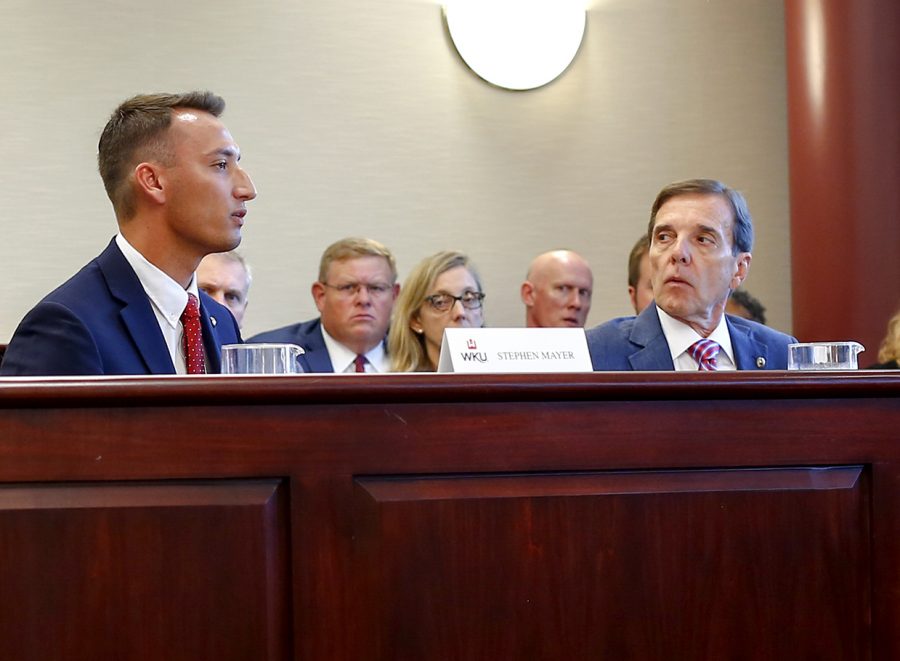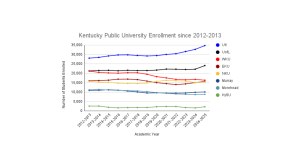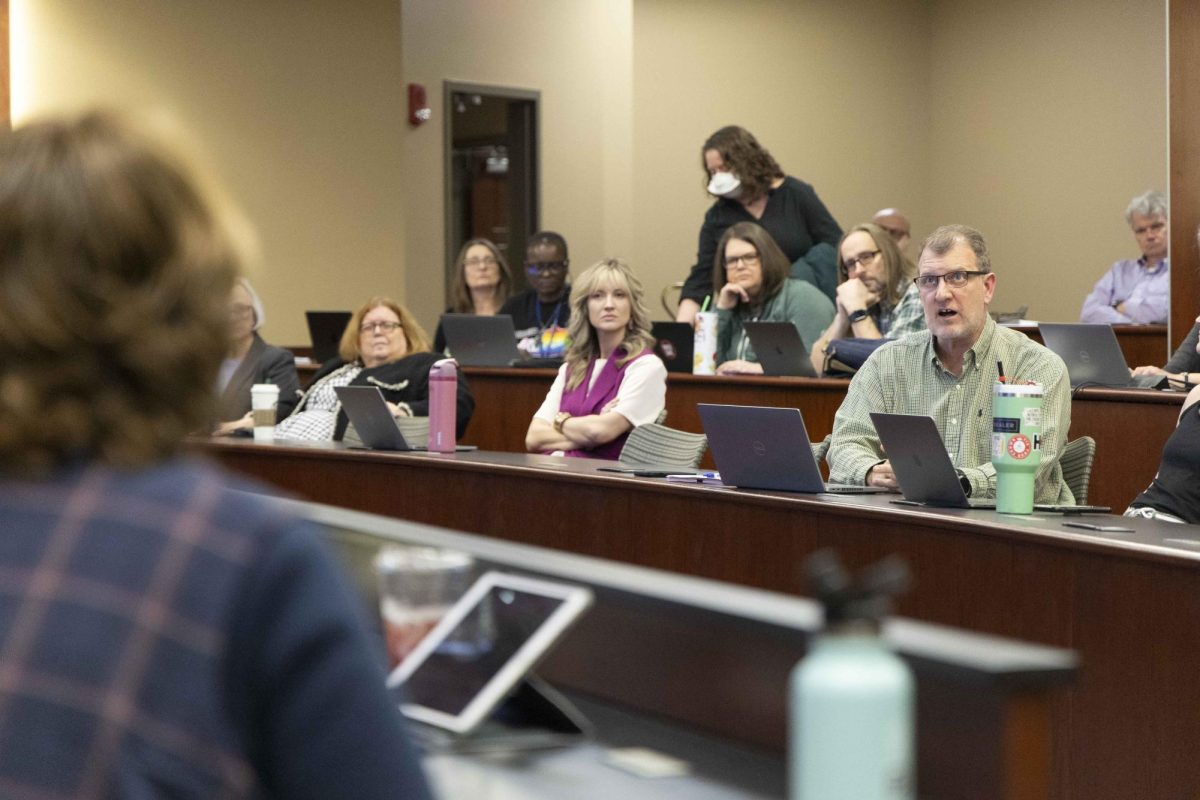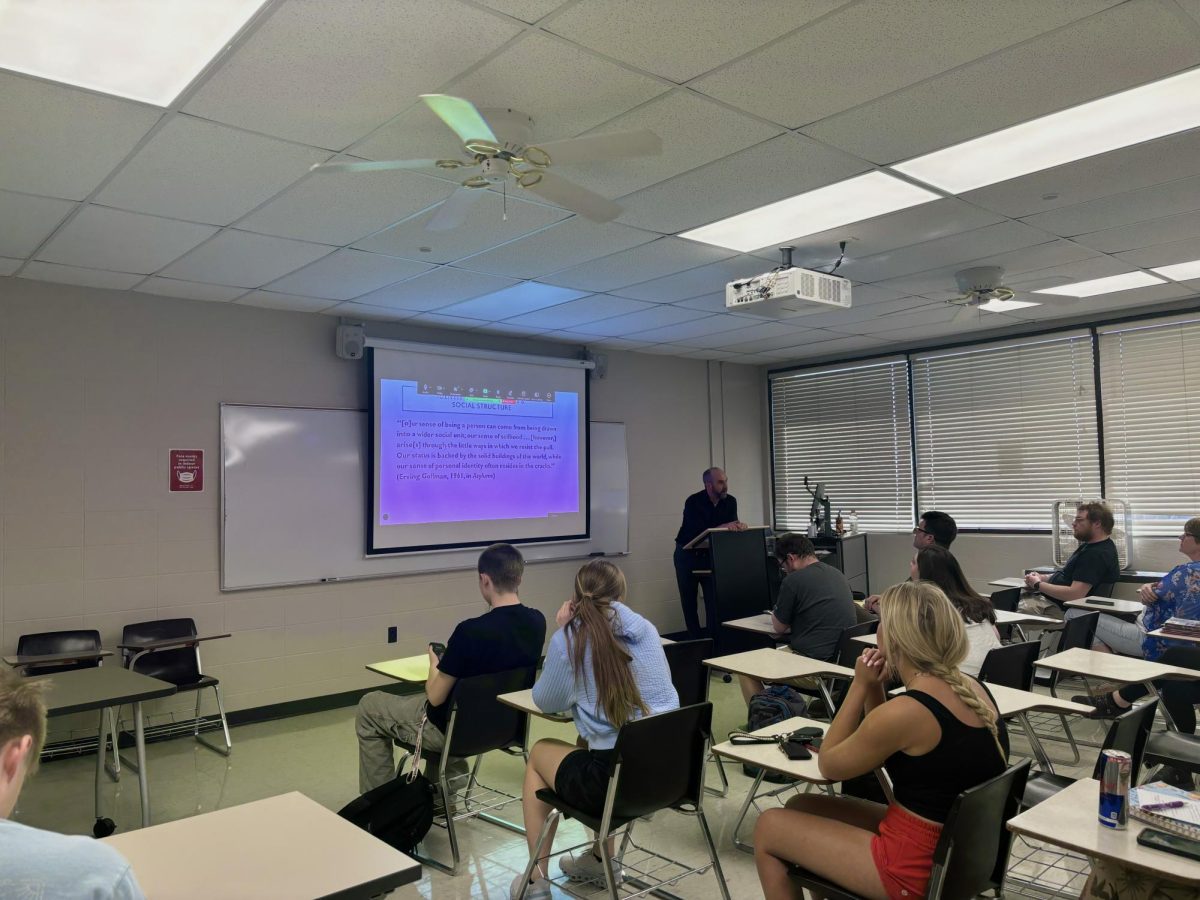Board of Regents approves 4 percent tuition increase
June 22, 2018
The WKU Board of Regents approved raising in-state undergraduate tuition by 4 percent, as well as online course fees, when it approved the 2018-19 operating budget during a special meeting on Friday.
“This is the culmination of a lot of hard work that began some time ago, talking to the administration, talking to the budget council, talking to the university staff and faculty and all the stakeholders involved,” Gil Johnson, the regents’ vice chair, said at the start of the meeting.
In a 10-1 vote, the board approved raising tuition to $5,301 per semester for in-state undergraduate students, and increasing the fee for taking a course online to $150 per credit hour. Tuition also will increase for out-of-state undergraduate students and international students.
Stephen Mayer, in his first meeting as student regent, was the only board member to vote against the budget. Before the vote, he raised concerns about increasing tuition and online course fees.
Mayer said fellow students had told him the higher costs at WKU would force them to finish their general education classes at a community college and then return to WKU to complete their degrees.
“That was really concerning to me,” Mayer said. “It’s upsetting to know we’re going to lose students for a little bit of time. Instead of having them here for four years, they’ll be here for two years.”
Under the approved budget, tuition will go up $200 a semester, from the former rate of $5,101. Out-of-state undergraduate students will also face an increase by at least 3 percent, from $12,756 to $13,248 per semester. For international students, tuition will increase from $13,080 a semester to $13,572.
The tuition increases will generate more than $5.5 million, according to documents provided by the Board of Regents.
Although faculty regent Claus Ernst said he was in support of the budget, he said he also did not like the increases to tuition and online course fees.
“We used to be a really good bargain and now we’re just sort of competitive,” Ernst said.
President Timothy Caboni addressed the concern of the financial burden being placed solely on the backs of the students.
“If you look at the complete number of 2017 dollars, it wouldn’t have been possible to place the burden of that on the backs of students and their families,” Caboni said.
Caboni said that looking at the “totality of the cost” of WKU in comparison to other competing universities was taken into account with creating the budget.
“Affordability is always at the forefront of our minds as we assemble these budgets and think about the burden on students and families to pay for what is a remarkable experience,” Caboni said.
A 4 percent tuition increase for 2018-19 means that the maximum increase for 2019-20 would be 2 percent, under guidelines set by the Kentucky Council on Postsecondary Education for the coming two years.
The new tuition revenue would be used to fund pay raises for WKU faculty and staff,according to the Board of Regents documents.
WKU had a salary increase of 4 percent in 2008, but increases since then have been minimal or nonexistent,according to documents provided to the finance committee, leaving employee pay lagging benchmark institutions and the private sector.
Creating a 4 percent salary-increase pool would cost WKU about $5.1 million annually, according to the Board of Regents documents.
Ann Mead, senior vice president for finance and administration,said the decision of how the raises will be allocated has not been made yet, but it will be made in the fall and the raises will take effect on Jan. 1, 2019. She expressed her optimism for the budget and the raises it will create for faculty and staff members in a speech that she made to the board.
“The outcome is positive, and I think you would be pleased in this budget,” Mead said to the regents.
The 2018-19 operating budget is $388.4 million, down 6.1 percent from the 2017-18 budget.
Tuition will generate $197.9 million in revenue, or about 51 percent of the total budget. State appropriations, $74.4 million, make up only 19 percent of the budget 2018-19 budget.
On the spending side, the Division of Academic Affairs accounts for $150.9 million, or about 39 percent of the operating budget. Among other areas of spending, Athletics accounts for $22.6 million, or just under 6 percent of the budget.
Mayer said he was concerned about the impact the tuition and fee increases — particularly the 50 percent increase in the online course fee — would have on students.
“I’m upset that we have a 4 percent tuition increase and also that we increased our online course fees for the students, and I’m sad that we put the financial burden on the students’ backs,” Mayer said.
Mayer said he “wanted to applaud” the finance committee for recognizing the faculty and staff in allocating the salary increases, but he said the students were still going to feel a financial burden due to the increases to tuition and online course fees.
“In regards to students, unfortunately, we’re taking a hit here,” Mayer said. “I’m going to fight in this next year so that maybe we don’t see any more increases in any kind of student fees for the next year in the development of the next budget, as I will see the development of the next budget from start to finish.”
Also on Friday, the Board of Regents approved four new certificate programs to be implemented in fall 2018, which included one graduate certificate and three undergraduate certificates.
The graduate certificate will be in local government administration through the Potter College of Arts & Letters. The certificate will require 12 credit hours. The undergraduate certificates approved by the board included a certificate in deaf studies, early childhood education directing and user experience.
Nicole Ziege can be reached at 270-745-6011 and nicole.ziege825@topper.wku.edu. Follow Nicole Ziege on Twitter at @NicoleZiege.

















